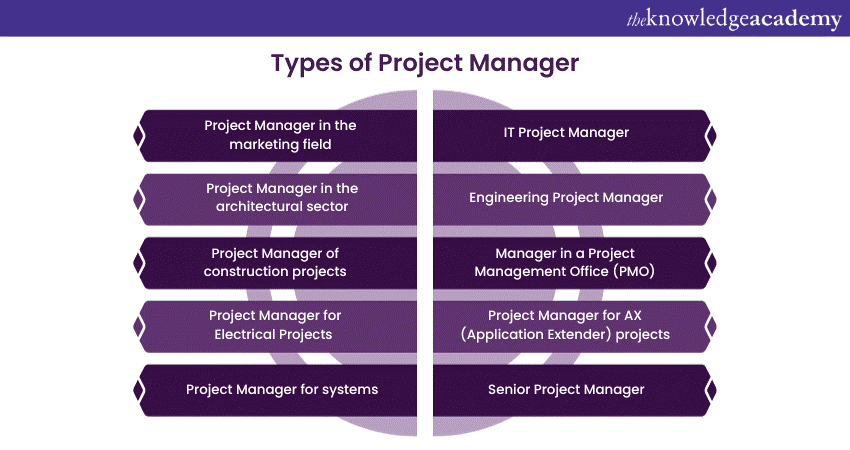We may not have the course you’re looking for. If you enquire or give us a call on 01344203999 and speak to our training experts, we may still be able to help with your training requirements.
We ensure quality, budget-alignment, and timely delivery by our expert instructors.

Project Management is an exciting and diverse arena, teeming with various Project Manager roles tailored to distinct industries, methodologies, and skill sets. Types of Project Manager is dynamic, adapting to the unique demands and hurdles of each project.
Whether you’re just starting out or have years of experience, getting to grips with the different Project Management positions is crucial. In this blog, we will explore the myriad Types of Project Managers—from those steering marketing campaigns to the ones orchestrating architectural marvels. Plus, we’ll give you a snapshot of their responsibilities, hallmark qualities, and typical industries they thrive in. Ready to dive in? Let’s get started and uncover more!
Table of content
1) Who is the Project Manager?
2) What Does a Project Manager Actually Do?
3) Types of Project Managers
a) Project Manager in the marketing field
b) Project Manager in the architectural sector
c) Manager of construction projects
d) Project Manager for electrical projects
e) Project Manager for systems
f) IT Project Manager
g) Engineering Project Manager
h) Manager in a Project Management Office (PMO)
i) Project Manager for Application Extender projects
j) Senior Project Manager
4) Conclusion
Who is the Project Manager?
A Project Manager leads and completes projects within the scope, time, and budget constraints in Project Management. Their responsibilities include coordinating with teams, setting goals, managing stakeholders, and overseeing project outcomes. They are also responsible for the project’s success or failure, whether launching a new product, building a structure, developing software, or running a marketing campaign.
The Project Manager holds the project together and influence the project’s performance and quality. Without a Project Manager, communication and collaboration among the departments would break down, and the project would fall apart. Therefore, it’s important to understand a Project Manager's skills, mindset, and attributes, and how they affect the work and productivity of everyone involved, ultimately impacting the Senior Project Manager Salary.
What Does a Project Manager Actually Do?
A Project Manager is the strategic leader who plans, executes, and finalises projects according to strict deadlines and within budget, ensuring the achievement of project objectives. They oversee the following tasks during the lifespan of a project:
1) Establishing the project’s scope: A Project Manager defines the boundaries and deliverables of the project. They ensures clarity and alignment with business objectives. This involves setting clear goals, deliverables, and success criteria.
2) Keeping to the schedule: They are responsible for creating a detailed Project Management Timeline and ensuring that the project stays on track. This includes managing deadlines and coordinating tasks to prevent delays.
3) Evaluating the cost of a project and keeping to a budget: Project Managers forecast the financial resources required for the project and manage the budget throughout its lifecycle, making sure that spending aligns with the initial estimates.
4) Project Resource Management (Including Teams and Employees): They oversee the allocation and utilisation of resources, including personnel, tools, and materials, to maximise efficiency and productivity.
5) Keeping track of the project’s progress: Monitoring the project’s advancement is key. Project Managers use various tools and methodologies to track progress and compare it against the plan.
6) Interaction with stakeholders: They maintain open lines of communication with all stakeholders, providing updates, gathering feedback, and adjusting project plans as necessary to meet stakeholder needs and expectations.
7) Identifying hazards: Risk identification and management are critical. Project Managers proactively pinpoint potential risks and develop strategies to mitigate them, ensuring the project’s smooth progression.
8) Troubleshooting: When issues arise, Project Managers are the first line of defence. They solve problems quickly and efficiently, often having to think on their feet to keep the project moving forward.
Ready to lead digital service projects to success? Register for our Certified Digital Services Project Manager (CDSPM) Course today!
Types of Project Manager
There are various Types of Project Managers, each specialising in different areas and industries. Here's an overview of some common Types of Project Managers:

Project Manager in the marketing field
This type of Project Manager specializes in overseeing marketing campaigns and initiatives. They are responsible for defining project objectives and creating marketing plans. Global Project Manager Job Description often includes managing teams and ensuring that marketing efforts are executed efficiently and effectively. Marketing Field Project Managers focus on achieving marketing goals while staying within budget and meeting deadlines. If you're preparing for this role, reviewing Project Manager Interview Questions can help you understand the key skills and competencies required.
Average Income: £54,427
Project Manager in the architectural sector
Project Managers in the architectural sector are responsible for managing architectural design and construction projects. They ensure that projects meet architectural specifications, comply with building codes and regulations, and are completed on time and within budget. They coordinate design teams, Contractors, and other stakeholders involved in the construction process.
Average Income: £104,677
Manager of construction projects
Construction Project Managers supervise the planning, execution, and completion of construction projects. They allocate and manage resources, maintain safety on construction sites, and ensure that the project adheres to building codes and quality standards. They play an important role in coordinating different construction phases and resolving possible issues.
Average Income: £51,457
Plan your career growth with insights on Construction Project Manager Salary!
Project Manager for electrical projects
These Project Managers lead projects related to electrical engineering. This can include tasks like designing and implementing electrical systems, assuring compliance with electrical codes, and managing electrical engineering teams. A comprehensive Project Engineer Job Description often includes responsibilities like installing, testing, and maintaining electrical systems.
Average Income: £54,784
Project Manager for systems
System Project Managers handle projects related to system integration, such as the implementation of software or hardware systems. They define project requirements, collaborate with development and IT teams, oversee testing and validation, and ensure system security, performance, and scalability. They troubleshoot technical issues and coordinate updates as needed.
Average Income: £63,862
Prepare for your digital project manager role with the top Digital Project Manager Interview Questions. Start practicing now!
IT Project Manager
IT Project Managers specialise in managing Information Technology projects. This ranges from Software Development to network infrastructure deployments. They define project objectives and requirements, allocate IT resources, create project schedules and budgets, and ensure the security and compliance of IT projects. They are also responsible for addressing IT-related issues and providing technical solutions.
Average Income: £63,862
Engineering Project Manager
These Project Managers oversee engineering projects, which can include product development, infrastructure projects, and process optimisation. They develop project plans that encompassing design, testing, and implementation phases. These professionals also manage engineering teams and ensure product quality, safety, and regulatory compliance. They also address engineering challenges and process improvements.
Average Income: £65,949
Join our Project Management Certification today and take the leap towards becoming a Project Management expert!
Manager in a Project Management Office (PMO)
PMO Managers are responsible for developing and maintaining Project Management standards and best practices within an organisation. They oversee a portfolio of projects, monitor project performance, and provide guidance to Project Managers. Furthermore, PMO Managers develop Project Management Methodologies and tools and streamline project communication and reporting. They also evaluate project risks and propose mitigation strategies.
Average Income: £54,777
Project Manager for Application Extender (AX) Projects
Project Managers specialise in managing projects related to implementing and customising Application Extenders. They define project requirements and collaborate with Software Developers and Business Analysts. By overseeing testing and validation, they ensure seamless integration with existing systems and provide support and training to end-users.
Average Income: £52,064
Senior Project Manager
Senior Project Managers lead complex and large-scale projects or multiple projects simultaneously. They provide strategic direction and leadership to project teams and manage high-level stakeholder relationships and client interactions. In their Project Manager Job, they also develop and implement organisational Project Management strategies, and mentor and guide Junior Project Managers.
In addition, they take overall responsibility for project success, including Risk Management and conflict resolution, which is an essential aspect to highlight in a Project Manager CV. Their role is typically more strategic and encompasses a wider range of responsibilities than other Project Managers.
Average Income: £72,347
Source: Glassdoor
Take your Project Management career to the next level with our Certified Global Project Manager (CGPM) Course!
Conclusion
In this blog, we have provided insights into Types of Project Managers, shedding light on their roles and responsibilities. The field of Project Management is incredibly diverse, with various Types of Project Managers who specialise in different industries and project types. Each Type of Project Manager plays a unique and essential role, tailored to the specific needs and challenges of their respective domains. To excel in this dynamic field, professionals can explore Project Management Courses for Career Progression, which provide valuable skills and knowledge to advance their careers. Understanding the difference between Project Leader and Project Manager is crucial, as these roles, though related, have distinct responsibilities and skill sets. If you're wondering How to Become a Project Manager Without Experience, understanding these different roles can help you identify the right path to enter the field and develop essential skills.
Discover your path to success with our Project Management Courses today!
Frequently Asked Questions
What are the career growth prospects for Project Managers?

Career growth prospects for Project Managers are promising, with paths leading to senior roles like Program Manager or Director of Project Management. Opportunities expand into consulting, executive leadership, or specialised areas like IT and construction, enhancing both skills and earning potential.
How do Project Managers collaborate with other team members?

Project Managers collaborate with team members by setting clear goals, facilitating communication, and coordinating tasks. They ensure alignment on objectives, offer support and resources, and resolve conflicts, fostering a cooperative environment that drives project success.
What are the other resources and offers provided by The Knowledge Academy?

The Knowledge Academy takes global learning to new heights, offering over 3,000 online courses across 490+ locations in 190+ countries. This expansive reach ensures accessibility and convenience for learners worldwide.
Alongside our diverse Online Course Catalogue, encompassing 19 major categories, we go the extra mile by providing a plethora of free educational Online Resources like News updates, Blogs, videos, webinars, and interview questions. Tailoring learning experiences further, professionals can maximise value with customisable Course Bundles of TKA.
What is the Knowledge Pass, and how does it work?

The Knowledge Academy’s Knowledge Pass, a prepaid voucher, adds another layer of flexibility, allowing course bookings over a 12-month period. Join us on a journey where education knows no bounds.
What are related courses and blogs provided by The Knowledge Academy?

The Knowledge Academy offers various Project Management Courses, including Introduction to Project Management Certification Course and Project Management Masterclass. These courses cater to different skill levels, providing comprehensive insights into Project Management Resource Management.
Our Project Management Blogs cover a range of topics related to Project Management Skills, offering valuable resources, best practices, and industry insights. Whether you are a beginner or looking to advance your skills in Project Management, The Knowledge Academy's diverse courses and informative blogs have you covered.
Upcoming Project Management Resources Batches & Dates
Date
 Introduction to Project Management Course
Introduction to Project Management Course
Fri 9th May 2025
Fri 15th Aug 2025
Fri 10th Oct 2025
Fri 12th Dec 2025






 Top Rated Course
Top Rated Course



 If you wish to make any changes to your course, please
If you wish to make any changes to your course, please


